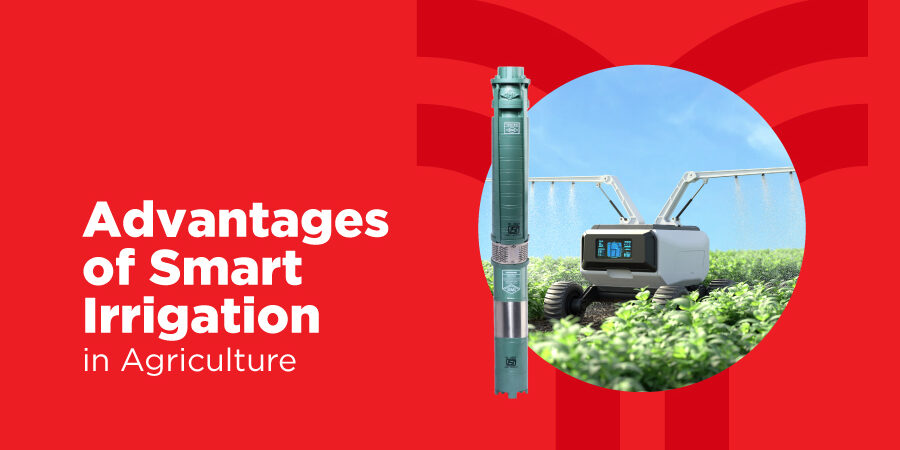Unlocking the Benefits: Smart Irrigation in Agriculture
Smart Irrigation = Minimum Water Usage + Maximum Yields
Water has always been a precious resource in agriculture. However, now water management is more important than ever. This is because of the growing populations and the extreme changes in the climate pattern. For optimum water management smart irrigation is considered to be the only solution.
By leveraging modern technology and data driven approaches smart agriculture is promising to assure minimum usage of water in agriculture to maximise yields. According to FAO, more than 20% of the global agricultural land is affected by salinity and waterlogging. Salinity can degrade the land overtime, and waterlogging can spoil the hard-grown crops.
This blog explains the advantages of smart irrigation in agriculture. Read further to know about it.
Understanding Smart Irrigation:
Smart irrigation goes beyond the conservative methods of water in crops. It scientifically measures lets out and stops the water according to the modern devices and its calculations. Some of the technology and devices provided by water pump manufacturers in coimbatore include
- Water sensors
- Weather forecast
- Other automated devices
These devices continuously monitor the moisture level of the soil, weather conditions and crop requirements to ensure that water is used efficiently and without any wastage. This optimises plant growth without unnecessarily wasting water.
Benefit One: Water Conservation
One of the fundamental advantages of smart irrigation is its ability to conserve water. As per the report of the United Nations Food and Agriculture Organisation, irrigation takes up more than 70% of the Global freshwater. Along with this huge usage a significant portion of water is wasted because of inefficient irrigation practices.
Under the present circumstances, it is very important to curtail the wastage of water. Smart irrigation addresses decisions by optimising the water application. For instance, submersible water pumps in agriculture optimises water delivery, reduces waste, and promotes sustainability. By adopting scientific techniques in water usage and reducing losses, modern irrigation assures that farmers can reduce water wastage up to 40%.
This is considered to be a great technique as reduced water flow does not translate into reduced crop yields. In the country, along with water conservation they also promise increased crop yields. This not only helps farmers but also regions that are chronically affected with water scarcity.
Benefit Two: Increased Crop Yields
Smart education techniques make sure that enough water is provided to do plans at every stage of growth. this helps with
- Promotion of healthier root development
- Improve nutrient absorption
- Overall plant vigour
By checking whether all these three components are provided to the plant, they promise higher crop yields and better quality produce.According to a world bank report, adopting smart irrigation techniques increase crop produce up to 20% when compared to the conventional methods of irrigation. The outcome of this is particularly seen by the significant improvements in food security and farmer incomes.
In addition by ensuring consistent and uniform water provision across the fields, farmers will be able to reduce crop stress that takes place during waterlogging or drought. Water stress issues are found to be very acute especially during the growth during specific growth stages such as flowering and floating. Thanks to smart irrigation, it supports plants in critical stages.
Benefit Three: Cost Savings
It is true that the initial investment of smart education technology can seem expensive. However in the long term the car savings can be substantial. For instance, smart irrigation makes use of wastewater pumps for recycling and repurposing wastewater for irrigation, fertilisation, or other non-potable purposes.
Also, smart irrigation also helps with savings in the energy cost. According to the US environmental protection agency, the water needs in agriculture accounts for 80%. This directly affects the operational cost of the farmers. With smart irrigation a significant portion of the overall expenses can be reduced.
Benefit Four: Environmental Benefits
Modern irrigation techniques also favours the environment apart from the farmers. As it helps with reducing water runoff, it eliminates soil erosion, water pollution and Habitat destruction. As agriculture is now using a lot of fertilisers and other agrochemicals, indiscriminate water runoff can become a major contributor of water pollution.
These Hi-Tech solutions save the environment from this new kind of environmental pollution. In addition farmers can help save freshwater resources and contribute to the overall environmental system update. The need for chemical fertilisers and pesticides will also reduce overtime by promoting healthy soil and plant growth. This again helps to reduce the environmental footprint of agriculture.
Benefit Five: Precision Agriculture
Precision agriculture is a farming approach that uses Technology to assure the optimal utilisation of inputs and maximisation of outputs. This is one of the key components of smart agriculture. With the combination of technologies like GPS, drones, and Data Analytics, farmers are empowered to create highly detailed maps of their fields. Using this data farmers can scientifically allocate resources, minimise water usage and maximise yields leading to a profitable farming.
Benefit Six: Adaptability to Climate Change
Modern irrigation techniques are the only way to escape from The challenges posed by climate change. It helps to develop flexible and adaptive solutions by continuously monitoring environmental conditions and providing irrigation schedules. It can help with extreme circumstances such as,
- Drought
- Heat waves
- Floods
It helps to cope with situations and ensures food security and agricultural productivity. It also helps farmers to adopt specific patterns and techniques to adapt in this weather transition and reduce vulnerability.
Conclusion :
Overall smart irrigation provides the tremendous potential that is required to revolutionise agriculture in these changing circumstances. Consider adapting these new techniques if you are serious about increasing crop production and promoting environmental sustainability. By correctly harnessing the power of technology and scientific information, farmers can cope with the new challenges such as water scarcity, climate variability, and increasing operation cost.


